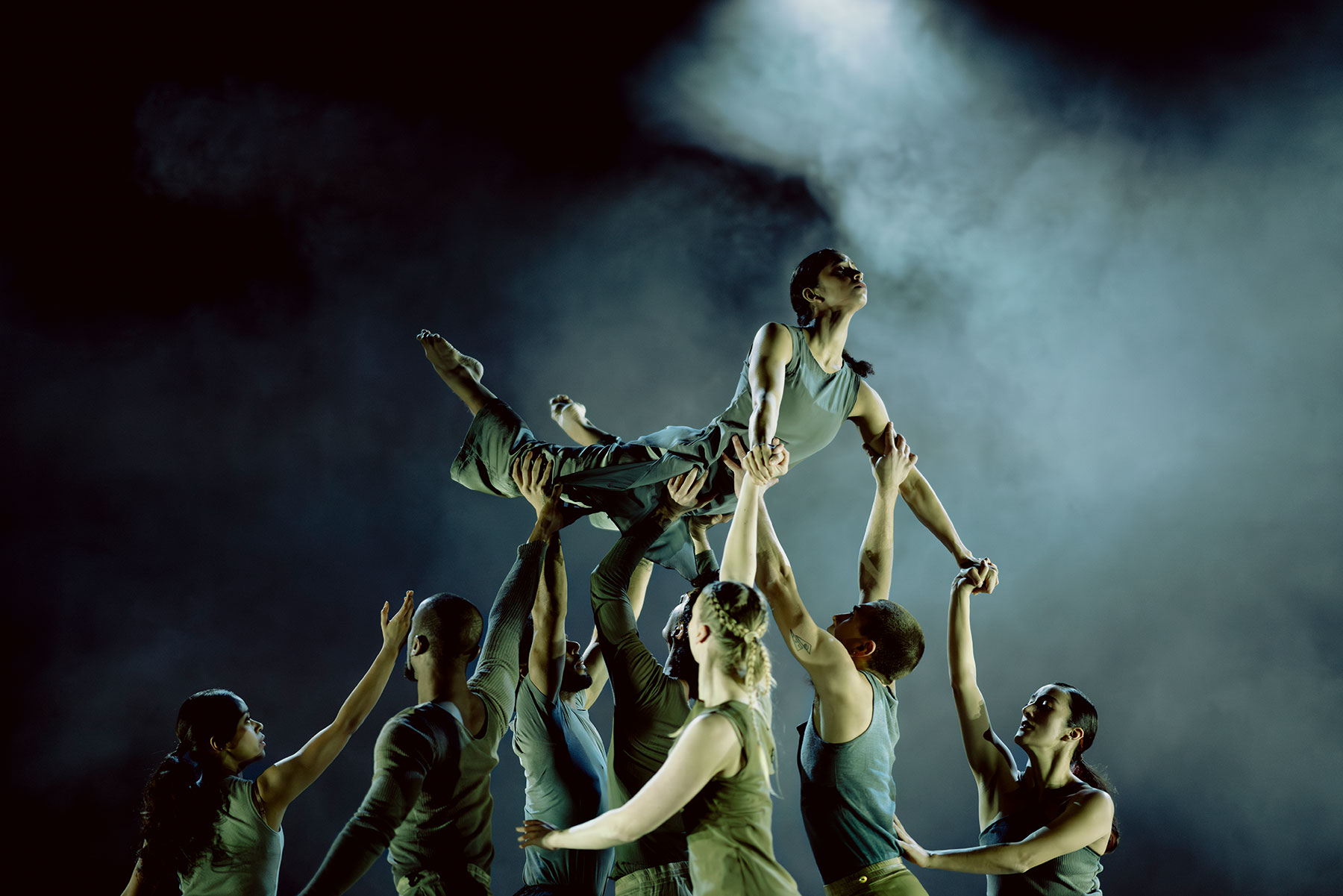
I was filled with anticipation at the prospect of watching Phoenix Dance Theatre’s matinee performance of Belonging: Loss. Legacy. Love. 22-23 March 2024 • Afridiziak Theatre News at The Place, London. It had been many years since I’d experienced this company’s work and even longer since I danced with them. I was eager to see their cohort of dancers, their artistic direction, and their new triple bill: Belonging. The production showcased three works by international choreographers: Dane Hurst (South Africa), Miguel Altunaga (Cuba) & the new artistic director of Phoenix, Marcus Jarrell Willis (USA).
Dane Hurst’s Requiem was the first piece presented in the trio of works. The bare stage except for two benches, were highlighted by minimal stark light, our ears were attuned and then consumed by an emotive orchestral swell of Mozart’s Requiem. Bodies crawled into the space, like creature’s trying to find refuge and respite after a storm. The embittered dancers adorned with simple garments – singlets and trousers in purples, greys, and silvers.
There is a collective passing of bodies, limbs – which are reaching, yielding, retreating, and yearning. The dancers are literally turned upside down in response to their internal world being negatively impacted.
Choregraphed as a response to the loss and grief experienced as a result of the Covid pandemic, Requiem is a lament, which we feel in our very viscera.
Reminiscent of a biblical allegory, Requiem is a kin to a period portrait bursting into life. We are witness to people falling and rising, bodies in need of support, but resistant to comfort. Protagonists who are trying to navigate themselves through new emotional territory in an unfamiliar world – trying to find balance on a ground which is constantly shifting.
The musicality and fluidity within the choreographic composition is beautifully executed by Hurst and exquisitely embodied by dancer Aaron Chaplin.
The internal struggle of the performers is portrayed well, I would have loved to witness motifs of this emotionally raw struggle earlier in the work, as portrayed in a very moving section towards the end of the piece; which captures the fragility and breakdown of people in grief.
Shout out to Hannah Mcglashon, Teige Bisnought, Dylan Springer, and Aaron Chaplin for their sensitive and seamless quartet.
Another stand out moment was a breath-taking male trio where the dancers embodied waves ebbing and flowing impacted by the tide.
It is not easy to match the epic nature of Mozart’s Requiem without plunging into melodrama. Hurst and dancers were true to their vision and delivered a noteworthy and touching piece of dance theatre.
Cloud Burst was the next offering by Phoenix, choreographed by Miguel Altunaga. This extremely physical and transformative piece explores man’s relationship with community, cultures, myth, and ancestral legacy.
From the beginning, Cloud Burst demands attention – three pillars stand resolute in the space like totems created by ancient deities. Five entities sit facing away from the audience scratching at the earth in dim light. There is a golden bowel downstage right which the dancers interact with, as if it was the source of all knowledge. These entities (dressed in white boiler suits splattered with soil) are the conduits for the souls of past ancestors – the keepers of blood memories, which have been passed from generation to generation.
Vignettes featuring images of struggle, manipulation, arrogance, comedy, disdain, and political commentary are depicted fiercely by the dancers in literal and abstract tableaux. These effective groupings are reinforced by pools of light focused at specific areas in the space, lit only after periods of paused darkness.
Altunaga rich vocabulary is transcendent and ranges from ritualistic gesture to tribal motifs and movement derived from a devotion to the Orisha’s. Elements of Krump, African’s people dance, and Cuban social dancing are all deliciously developed and offered as a feast for the senses.
The dancers morph from human beings struggling for breath to creatures devouring space in search for secure terrain. The performers move as a tribal pack in ever changing formations, and in contrast dance as opponents fighting for survival. Committed to delivering high octane choreography, the dancers seemed processed while dancing to the evocative soundscape.
The spiritual and urgent sound score designed by David Preston is a timeline, sonically capturing time past, the present and an impeding future – featuring elemental sounds, culturally specific percussion, and basslines that summon the ground to crack open!
Kudos to dancers Phikolwethu Luke, for his intensity and dynamism, and to Dorna Ashory for her drive and passion.
Altunaga’s Cloud Burst is a tour de force; a moving indictment of man’s thirst for connection to the spiritual and earthly plains.
Marcus Jarrell Willis’s Terms of Agreement is an ambitious piece of dance theatre exploring familial, romantic and self-love. The work includes poetry, voice over and a playlist of music by various popular artists, composed by Tomos O’Sullivan.
The stage is given over to six tables and stools, set in an open square, around the perimeter of the space. These tables are illuminated beautifully to enhance and support the narrative when needed.
The space is slowly occupied by people who find themselves in differing states of being. The protagonists are individually dressed in tailored black and white costumes, but all have signature blood red socks.
Willis explores the turmoil and fallout of a family going through a divorce, a love triangle consisting or a heteronormative and homosexual relationship, the loss of a partner and the sense of acceptance and self-love needed to be resilient in a fragile world. The protagonists are searching for a place to belong to and a partner to be loved by.
Through touching lyrical dance, skilled contact work and arresting gestural phrases, Willis goes through the gambit or tumultuous affairs of the heart.
Terms of Agreement has collection of interesting ideas conveyed through authentic story telling. However, the lip syncing, and the use of props (i.e. contracts being physically handed out) I believe, are not necessary, as the movement and clear structure speaks strongly to the vision of the piece.
Dancer Yasmina Patel has to be commended for her presence throughout the work; especially when she embodies the vivid imagery of the accompanying poem – carving through the space and giving an emotional arch to her character, thus contributing to the previous section and the next vignette after her own.
Other commendations go to Aaron Chaplin and Dylan Springer for their delicate, vulnerable, and sensuous duet.
Marcus Jarrell Willis has much to feel accomplished by in Terms of Agreement as the subject matter is so complex. As the new artistic director Willis’s inaugural programme for Phoenix Dance Theatre is to be applauded as well as his cohort of talented, technical, and strong dancers.
As a former dancer of Phoenix Dance Theatre, I was proud, to witness Belonging, and felt assured that their future is in good hands.
NEED TO KNOW: Belonging: Loss. Legacy. Love by Phoenix Dance Theatre played at The Place, London, 22-23 March 2024 | See listing.


























